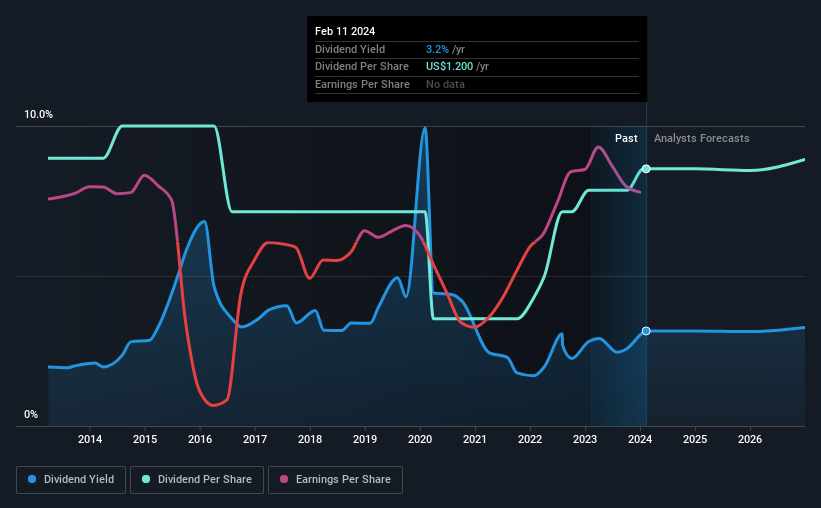Is It Smart To Buy Murphy Oil Corporation (NYSE:MUR) Before It Goes Ex-Dividend?
Readers hoping to buy Murphy Oil Corporation (NYSE:MUR) for its dividend will need to make their move shortly, as the stock is about to trade ex-dividend. The ex-dividend date is one business day before the record date, which is the cut-off date for shareholders to be present on the company's books to be eligible for a dividend payment. The ex-dividend date is an important date to be aware of as any purchase of the stock made on or after this date might mean a late settlement that doesn't show on the record date. Therefore, if you purchase Murphy Oil's shares on or after the 16th of February, you won't be eligible to receive the dividend, when it is paid on the 4th of March.
The company's next dividend payment will be US$0.30 per share, and in the last 12 months, the company paid a total of US$1.20 per share. Last year's total dividend payments show that Murphy Oil has a trailing yield of 3.2% on the current share price of US$37.89. We love seeing companies pay a dividend, but it's also important to be sure that laying the golden eggs isn't going to kill our golden goose! That's why we should always check whether the dividend payments appear sustainable, and if the company is growing.
View our latest analysis for Murphy Oil
If a company pays out more in dividends than it earned, then the dividend might become unsustainable - hardly an ideal situation. Fortunately Murphy Oil's payout ratio is modest, at just 26% of profit. A useful secondary check can be to evaluate whether Murphy Oil generated enough free cash flow to afford its dividend. Thankfully its dividend payments took up just 26% of the free cash flow it generated, which is a comfortable payout ratio.
It's positive to see that Murphy Oil's dividend is covered by both profits and cash flow, since this is generally a sign that the dividend is sustainable, and a lower payout ratio usually suggests a greater margin of safety before the dividend gets cut.
Click here to see the company's payout ratio, plus analyst estimates of its future dividends.
Have Earnings And Dividends Been Growing?
Companies with consistently growing earnings per share generally make the best dividend stocks, as they usually find it easier to grow dividends per share. Investors love dividends, so if earnings fall and the dividend is reduced, expect a stock to be sold off heavily at the same time. That's why it's comforting to see Murphy Oil's earnings have been skyrocketing, up 36% per annum for the past five years. Murphy Oil is paying out less than half its earnings and cash flow, while simultaneously growing earnings per share at a rapid clip. This is a very favourable combination that can often lead to the dividend multiplying over the long term, if earnings grow and the company pays out a higher percentage of its earnings.
The main way most investors will assess a company's dividend prospects is by checking the historical rate of dividend growth. Murphy Oil's dividend payments are effectively flat on where they were 10 years ago.
Final Takeaway
Is Murphy Oil an attractive dividend stock, or better left on the shelf? Murphy Oil has grown its earnings per share while simultaneously reinvesting in the business. Unfortunately it's cut the dividend at least once in the past 10 years, but the conservative payout ratio makes the current dividend look sustainable. Murphy Oil looks solid on this analysis overall, and we'd definitely consider investigating it more closely.
So while Murphy Oil looks good from a dividend perspective, it's always worthwhile being up to date with the risks involved in this stock. Every company has risks, and we've spotted 1 warning sign for Murphy Oil you should know about.
Generally, we wouldn't recommend just buying the first dividend stock you see. Here's a curated list of interesting stocks that are strong dividend payers.
Have feedback on this article? Concerned about the content? Get in touch with us directly. Alternatively, email editorial-team (at) simplywallst.com.
This article by Simply Wall St is general in nature. We provide commentary based on historical data and analyst forecasts only using an unbiased methodology and our articles are not intended to be financial advice. It does not constitute a recommendation to buy or sell any stock, and does not take account of your objectives, or your financial situation. We aim to bring you long-term focused analysis driven by fundamental data. Note that our analysis may not factor in the latest price-sensitive company announcements or qualitative material. Simply Wall St has no position in any stocks mentioned.

